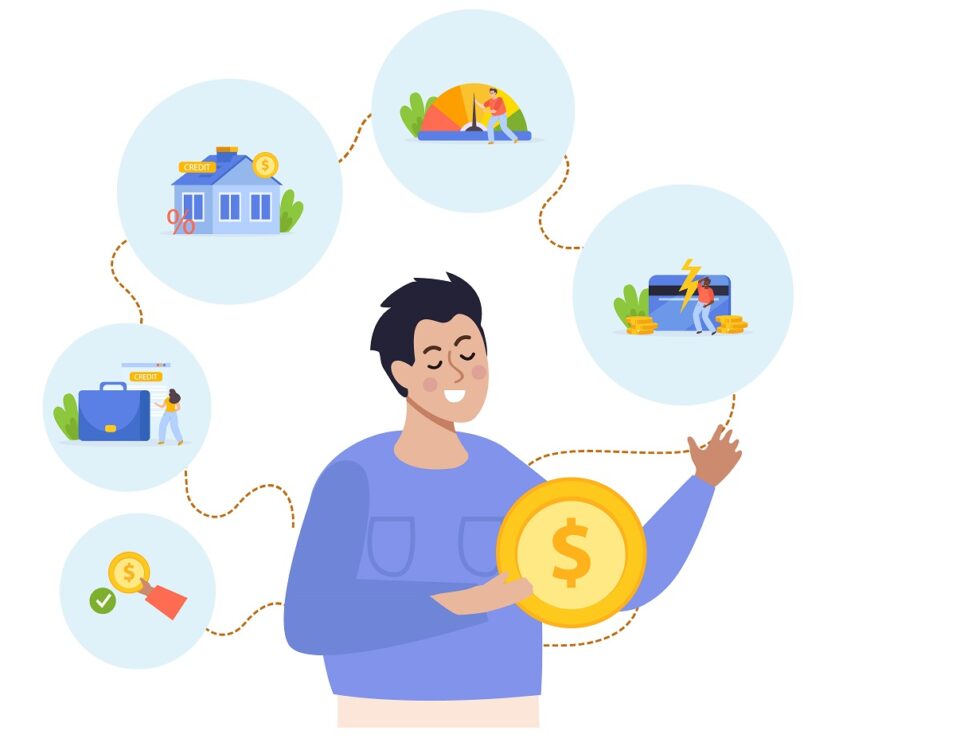- Credit Restoration Experts Nationwide

What is the E-OSCAR System for credit reporting?
October 4, 2023
What’s the Truth Behind the Perfect Credit Score Myth?
October 8, 2023Payment History and Points: What’s the Potential Impact on Your Credit Score?

Your credit score is like a financial report card that lenders, landlords, and potential employers use to assess your creditworthiness. At the core of this crucial metric lies your payment history, a fundamental factor that greatly influences your credit score. Even if it is affected, you’ve got a solution in the form of Credit Repair.
Your payment history encompasses the record of every payment you’ve made on credit accounts, such as credit cards, loans, and mortgages, over time. It highlights whether you’ve paid your bills on time, missed payments, or defaulted on any accounts. This information is then used to calculate your credit score.
Payment history typically accounts for a significant portion of your credit score, often around 35% or more, depending on the credit scoring model being used. This makes it one of the most critical aspects of your creditworthiness.
A spotless payment history, where you consistently make on-time payments, can have a profoundly positive impact on your credit score. It demonstrates to lenders that you are a responsible borrower, which can open doors to better credit terms and lower interest rates.
On the flip side, late payments, missed payments, or defaults can have a detrimental effect on your credit score. They signal financial instability and can lead to a lower credit score, making securing loans, obtaining credit cards, or even renting a home more challenging.
Understanding the importance of payment history is the first step toward managing your credit score effectively. Regularly reviewing your credit report, setting up payment reminders, and budgeting to ensure timely payments are crucial strategies to maintain a healthy payment history.
How Late Payments Can Affect Your Credit Score
Late payments are like blemishes on your credit report, and their impact on your credit score can be significant. Even a single late payment can cause your credit score to drop, and the longer the payment is overdue, the more damage it can do.
Here’s how late payments can affect your credit score:
- Payment History Damage: Late payments are recorded on your credit report, indicating when the payment was late and by how many days. The more recent and severe the delinquency, the more it can harm your credit score.
- Credit Score Reduction: A late payment can lead to a noticeable decrease in your credit score. The exact drop depends on factors like the severity of the delinquency, your overall credit history, and the scoring model used.
- Long-Term Impact: Late payments can have a lasting impact on your credit score because they remain on your credit report for up to seven years. The more time that passes since the late payment, the less it will affect your score, but it still lingers as a negative mark.
- Lender Perception: Lenders view late payments as a sign of financial irresponsibility. They may be less likely to approve you for new credit or may offer less favorable terms if they see recent late payments on your report.
To minimize the impact of late payments on your credit score, it’s essential to make payments on time consistently. Setting up automatic payments or reminders can help you stay on track and avoid late payments. If you do miss a payment, consider reaching out to your creditor to discuss your situation and negotiate options to bring the account current.
On-Time Payments: The Key to a Healthy Credit History
Maintaining a healthy credit history is all about making on-time payments. Your payment history is a reflection of your ability to manage your financial obligations responsibly, and on-time payments are a key indicator of this.
Here are some reasons why on-time payments are crucial for a healthy credit history:
- Positive Credit Score Impact: On-time payments have a positive impact on your credit score. They show that you are a reliable borrower who meets their financial commitments.
- Creditor Trust: Consistently making payments on time builds trust with your creditors. This can lead to increased credit limits, better interest rates, and more favorable terms on loans and credit cards.
- No Negative Marks: When you pay on time, you avoid negative marks on your credit report, such as late payments or defaults. These marks can significantly damage your credit score and take years to recover from.
- Improved Financial Opportunities: A history of on-time payments opens doors to better financial opportunities. You’ll be more likely to qualify for loans, credit cards with rewards, and even lower insurance premiums.
To ensure on-time payments, consider setting up automatic payments for your bills or creating a budget that includes due dates for each financial obligation. Regularly monitoring your accounts and credit repair can also help you catch any potential issues before they become late payments.
The Myth of Minimum Payments: How They Impact Your Credit
Minimum payments on credit card bills might seem like a convenient way to manage your finances, but they come with potential pitfalls that can affect your credit.
Here’s the myth: Many people believe that as long as they make the minimum payment due on their credit card statement, they are in good standing and their credit won’t be negatively impacted. However, this is not entirely accurate.
While making the minimum payment by the due date prevents you from incurring late fees and penalties, it doesn’t necessarily safeguard your credit score. Here’s how minimum payments can impact your credit:
- High Credit Utilization: If you consistently make only the minimum payment on your credit card, you may carry a high balance from month to month. This high credit utilization ratio (the amount you owe compared to your credit limit) can negatively impact your credit score. It’s recommended to keep your credit utilization below 30% for optimal credit health.
- Accumulating Interest: Making minimum payments means you’re not paying off the full balance on your credit card. As a result, you’ll accrue interest on the remaining balance, leading to more debt over time.
- Negative Payment History: If you miss the minimum payment or make it late, it will be reported on your credit report as a late payment, which can harm your payment history and credit score.
To avoid these pitfalls, it’s advisable to pay more than the minimum payment whenever possible. This helps reduce your credit repair card balance faster, lowers your credit utilization, and minimizes interest charges. Additionally, always strive to make payments on time to maintain a positive payment history and protect your credit score.
Tips for Building a Strong Payment History from Scratch
Building a positive payment history is essential for achieving a healthy credit score, and if you’re starting from scratch, it’s not as daunting as it may seem. Here are some tips to get you started:
- Open a Secured Credit Card: Secured credit cards are a great entry point for those with no credit history. They require a deposit that serves as your credit limit, minimizing risk for the lender.
- Pay Bills On Time: Whether it’s rent, utilities, or other recurring payments, always pay them on time. Timely payments show responsible financial behavior.
- Become an Authorized User: If a family member or friend with good credit is willing to add you as an authorized user on their credit card, it can help establish a positive payment history on your credit report.
- Apply for a Credit Builder Loan: Some financial institutions offer credit repair builder loans designed to help you build credit. These loans typically have lower risk and can assist in boosting your credit history.
Best Practices for Maintaining a Positive Payment History
Maintaining a positive payment history is crucial for long-term financial health. Here are some best practices to ensure you stay on the right track:
- Set Up Payment Reminders: Use calendar alerts or mobile apps to remind yourself of due dates. Timely payments are the backbone of a strong payment history.
- Create a Budget: A well-structured budget can help you manage your finances effectively, making it easier to meet your financial obligations.
- Auto-Pay Your Bills: Consider automating payments for loans and credit cards to avoid the risk of forgetting due dates.
- Stay Below Your Credit Limits: Keep your credit card balances well below your credit limits. High credit utilization can negatively impact your credit score.
The Impact of Closing Credit Card Accounts on Payment History
Closing credit card accounts can have both positive and negative effects on your payment history and credit score. It’s essential to understand the potential consequences:
- Positive Impact: Closing a credit card account with a history of late payments or high balances can prevent further damage to your payment history.
- Negative Impact: Closing a long-standing credit card account with a positive payment history can shorten your credit history, potentially reducing your credit score.
Before closing any credit card account, consider the long-term implications and consult with a financial advisor if necessary.
How to Check and Monitor Your Payment History for Accuracy?
Monitoring your payment history for accuracy is crucial to ensure your credit report reflects your financial behavior accurately. Here’s how to do it:
- Get Your Free Annual Credit Reports: By law, you are entitled to one free credit report from each of the three major credit bureaus (Equifax, Experian, and TransUnion) annually. Visit AnnualCreditReport.com to obtain your reports.
- Review Your Payment History: Carefully examine the payment history section of your credit repair reports. Ensure all payments are accurately recorded, and there are no errors or fraudulent activities.
- Dispute Inaccuracies: If you find inaccuracies, dispute them with the credit bureau reporting the error. They are obligated to investigate and correct any errors found.
- Consider Credit Monitoring Services: These services provide ongoing access to your credit reports and notify you of any changes or potential issues. Always choose the best credit repair services.
Regularly monitoring your payment history ensures that your credit score is based on accurate information and helps you catch and address any issues promptly.

